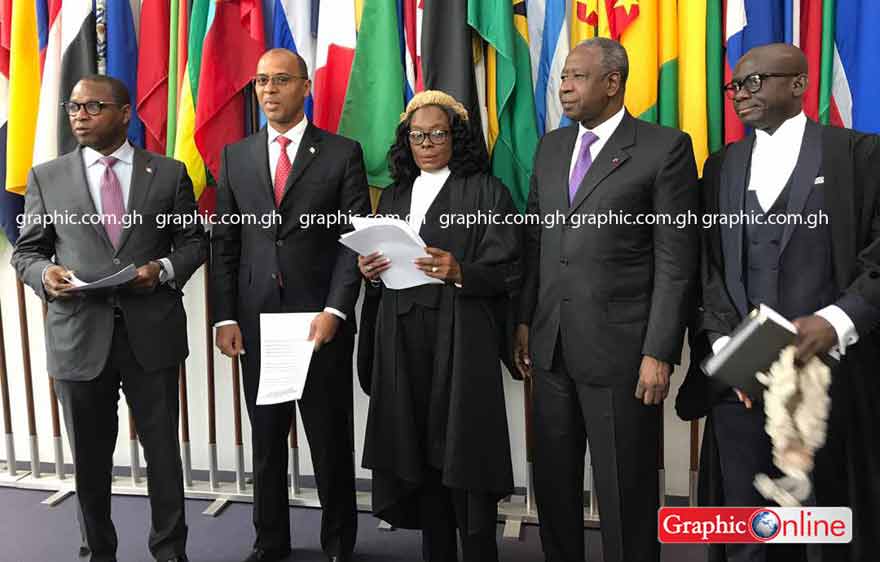
Ghana triumphs over maritime boundary dispute
Article Index
After three years of engaging in a maritime boundary dispute with Cote d’Ivoire, Ghana, last Saturday, emerged victorious in the case which has positive implications for the country’s oil and gas industry and development.
Advertisement
The Special Chamber of the International Tribunal for the Law of the Sea (ITLOS) constituted to hear the dispute unanimously declared that Ghana had not violated Cote d’Ivoire’s sovereign rights with Ghana’s oil exploration activities.
It also held that Ghana was not financially obligated to Cote d’Ivoire with respect to those activities to give rise to the issue of reparation (compensation).
The tribunal further rejected Cote d’Ivoire’s claim that Ghana disobeyed the tribunal’s April 25, 2015 preliminary orders which directed that new wells should not be drilled in the disputed area.
It also rejected Cote d’Ivoire’s claim that Ghana violated Article 83 of the United Nations Convention on the Law of the Sea (UNCLOS) and Cote d’Ivoire’s sovereign rights.
Article 83 of the UNCLOS, 1982, borders on agreement between states with opposite or adjacent coasts on the delimitation of customary boundary lines based on agreement on the basis of international law to achieve an equitable solution.
The Special Chamber held that it had jurisdiction to delimit the maritime boundary between the parties in the territorial sea, in the exclusive economic zone and on the continental shelf, both within and beyond 200 nautical miles (NM).
It, accordingly, found that there was no tacit agreement between the parties to delimit their territorial sea, exclusive economic zone and continental shelf, both within and beyond 200NM, and, therefore, rejected Ghana’s claim that Côte d’Ivoire was estopped from objecting to the customary equidistance boundary.
It, however, adopted Ghana’s argument for the equidistance boundary.
For that reason, it unanimously rejected Ghana’s position that there had been a tacit agreement between it and Cote d’Ivoire for more than four decades and, accordingly, proceeded to draw a new and binding boundary for the two countries.
The new boundary
The tribunal has generated a new and binding boundary stretching from a new Land Boundary Point (LBP), called BP 55 Plus, and going out to sea up to and beyond 200NM.
In choosing a new LBP, it rejected both Ghana’s LBP (BP 55) and Cote d’Ivoire’s LBP, which was called Omega.
The new and binding line that the court has drawn covers the territorial sea, the 200NM exclusive zone and the area beyond 200NM. It has a general direction of 191 degrees.
This new and binding line fully protects all of Ghana’s existing oilfields and concessions and also protects all Ghana’s territory up to and beyond 200NM out to 350NM.
Ghana, indeed, gets an 150 additional NM per the new map generated by the tribunal.
“The Special Chamber unanimously decides that the single maritime boundary for the territorial sea, the exclusive economic zone and the continental shelf within and beyond 200NM starts at BP 55+ with the coordinates 05° 05’ 23.2” N, 03° 06’ 21.2’’ W in WGS 84 as a geodetic datum and is defined by turning points A, B, C, D, E, F with the following coordinates and connected by geodetic lines:
“A: 05° 01’ 03.7” N 03° 07’ 18.3” W
B: 04° 57’ 58.9” N 03° 08’ 01.4” W
C: 04° 26’ 41.6” N 03° 14’ 56.9” W
D: 03° 12’ 13.4” N 03° 29’ 54.3” W
E: 02° 59’ 04.8” N 03° 32’ 40.2” W
F: 02° 40’ 36.4” N 03° 36’ 36.4” W
“From turning point F, the single maritime boundary continues as a geodetic line starting at an azimuth of 191° 38’ 06.7’’ until it reaches the outer limits of the continental shelf,” the tribunal said.
The President of the Special Chamber constituted to hear the case, Judge Boualem Bouguetaia, read the 181- page judgement and commended both parties for conducting themselves well during the provisional measures and hearing.
Other members of the panel were judges Rüdiger Wolfrum from Germany and Jin-Hyun Paik from the Republic of Korea.
Ad hoc judges Thomas Mensah from Ghana and Ronny Abraham from France were selected by Ghana and Cote d’Ivoire, respectively, per the rules of the ITLOS.
Mr Mensah and Mr Paik delivered separate individual opinions in further support of the decision of the Special Chamber.
The Registrar of the Special Chamber was Mr Philippe Gautier.



